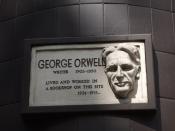"Close friendships, Gandhi says, are dangerous, because "friends react on one another" and through loyalty to a friend one can be led into wrong-doing. This is unquestionably true. Moreover, if one is to love God, or to love humanity as a whole, one cannot give one's preference to any individual person. This again is true, and it marks the point at which the humanistic and the religious attitude cease to be reconcilable. To an ordinary human being, love means nothing if it does not mean loving some people more than others. The autobiography leaves it uncertain whether Gandhi behaved in an inconsiderate way to his wife and children, but at any rate it makes clear that on three occasions he was willing to let his wife or a child die rather than administer the animal food prescribed by the doctor. It is true that the threatened death never actually occurred, and also that Gandhi - with, one gathers, a good deal of moral pressure in the opposite direction - always gave the patient the choice of staying alive at the price of committing a sin: still, if the decision had been solely his own, he would have forbidden the animal food, whatever the risks might be.
There must, he says, be some limit to what we will do in order to remain alive, and the limit is well on this side of chicken broth. This attitude is perhaps a noble one, but, in the sense which - I think - most people would give to the word, it is inhuman. The essence of being human is that one does not seek perfection, that one is sometimes willing to commit sins for the sake of loyalty, that one does not push asceticism to the point where it makes friendly intercourse impossible,


